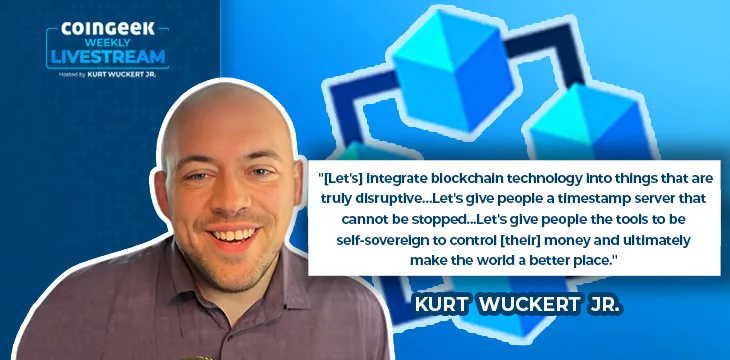|
Getting your Trinity Audio player ready...
|
On this episode of the CoinGeek Weekly Livestream, Chief Bitcoin Historian Kurt Wuckert Jr. answered viewers’ questions in an hour-long AMA session. Topics covered included the recent COPA v Wright court case, alternative blockchains, what decentralization really means, private blockchains and their flaws, the upcoming halving, and whether the world really wants what blockchain technology has to offer.
A big shock for the BSV blockchain community
“People’s worlds are in chaos,” Wuckert begins the livestream, summarizing the aftermath of the COPA vs. Wright debacle. While his haters have won their victory on the battlefield of Wright’s choosing, there doesn’t seem to be too much joy, he says.
However, Wuckert doesn’t want to focus on all of that too much. He’s never had Wright on his show, and he tried to focus on the hard-working entrepreneurs using the BSV blockchain to build services and solutions.
Why do people say the BSV blockchain is centralized?
Wuckert then turns his attention to viewer questions, beginning with why some people view the BSV blockchain as centralized. He says that Satoshi Nakamoto talked about
decentralization at a network level, meaning there was no single point of failure. A cultural shift happened somewhere along the line, and it became about the number of nodes.
Some say the BSV blockchain is centralized because mining is done heavily by TAAL, nChain has many patents, and the BSV Association holds licenses over the BSV blockchain software. However, these three have control over entirely different elements. BTC is controlled heavily by VC money, but nobody seems to think it’s centralized. In capitalism, a few strong players end up winning and have a lot of control; that’s just how it is.
Alternative blockchains
Are there other blockchains with low fees, high throughput, and Turing Completeness? There aren’t any alternatives. Many people don’t understand that BSV blockchain entrepreneurs aren’t in this for massive token price pumps. They’re here for the
fundamentals of the blockchain. Many of them have tried to build elsewhere and haven’t succeeded.
This desire to build rather than benefit from token pumps is a cultural difference, and it’s part of the reason many other camps don’t understand the BSV blockchain.
What are the risks of Amazon building its own chain?
Private companies have tried to make chains for years. IBM Hyperledger is an example. That team has slowly shrunk over the years because it doesn’t work at scale. If IBM (NASDAQ: IBM) can’t manage it, who can? Private chains also defeat the purpose of scalable public blockchains.
On the topic of scaling, Wuckert confirms that Teranode is using AWS. There are three nodes, which is technically all that’s necessary for decentralization.
nChain’s patents
It has been said that nChain’s patents will be free for BSV blockchain entrepreneurs. Wuckert can’t confirm this. However, they won’t be used against BSV blockchain builders and entrepreneurs. “You’ll know when you know,” he says.
The upcoming halving
What will happen to both BSV and BTC after the halving? Wuckert doesn’t know, but he thinks some interesting economics are at play. Miners’ public stocks can be profitable during a bull run. Also, because of how the difficulty adjustments work, there’s always a window of opportunity to switch hash power to the BSV blockchain. Many smaller and medium-sized miners will struggle to survive after their revenue is cut in half.
Do people, governments, and enterprises want the transparency and honesty the blockchain provides?
It doesn’t matter. The Catholic Church didn’t want the printing press either, but it took off regardless. That’s how disruption works. Governments and enterprises are the slowest to move and adapt, so it could be decades before the blockchain takes off.
Watch: Bitcoin15—Bitcoin’s Birthday and the future of scaling on Bitcoin

 02-27-2026
02-27-2026 




